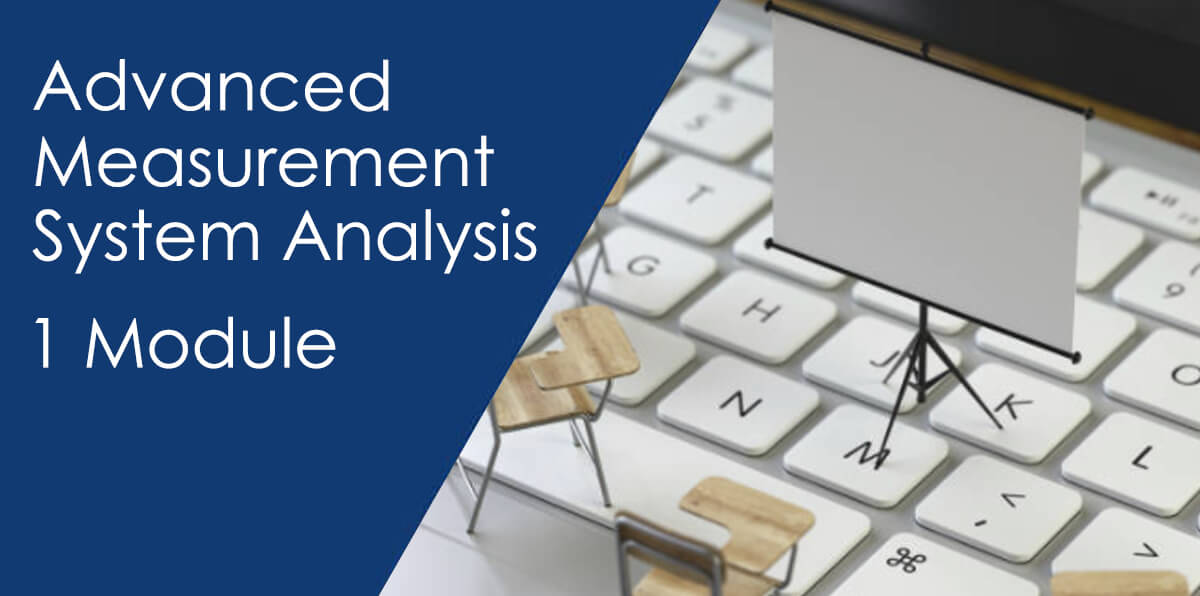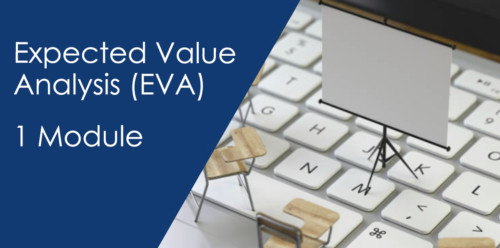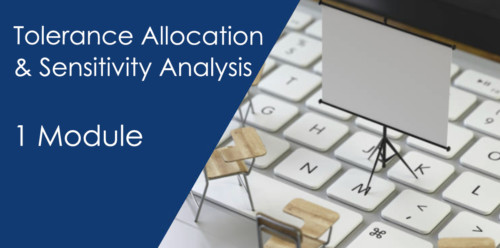Advanced Measurement System Analysis Short Course
$175.00
- Course Overview
- Course Structure
- Learning Objectives
- What’s Included
- What Sets Us Apart
- Reviews & Testimonials
- Job Opportunities
- Certification
- FAQs
- Reviews (0)
Course Structure
Topics Discussed
- Brief review of the what and why of MSA along with MSA measures
- Importance of part selection and a sampling technique for selecting parts
- Defining “operators” and interpreting reproducibility
- Destructive measurements and Nested ANOVA
- Reference values (bias and linearity studies)
- Agreement analysis with Attribute data
Learning Objectives
What’s Included
QUANTUM XL DEMO
Quantum XL, the Excel add-in for Statistical Analysis and Monte Carlo Simulation, now includes the following new features:
- Reliability Modeling – including Left, Right, and Interval Censored
- Improved Distribution Fitting
- Distribution Calculators – 14 Continuous and 7 Discrete
- Johnson Transformation
- Control Chart Enhancements
What Sets Us Apart
Air Academy Associates was one of the very first providers of the Lean Six Sigma Methodologies.
Our team has worked with Jack Welch, Mikel Harry, and Bill Smith (The Father of Six Sigma). We are arguably today’s longest running Lean Six Sigma Training and Certification company. Over the 35 + years we have been in operation, we have taught and trained close to 1 million people globally. This is why our clients trust us and continue to reach out for coaching and next level educational needs.
Now, Air Academy Associates offers the same world class training that we have been doing for more than 35 years in an online, self-paced format. This is allows our clients the flexibility to get training anywhere in the world – at any time. Air Academy Associates, a SDVOSB, has been a leader in supporting government, business, industry and healthcare with a network of highly-qualified and certified instructors and advisors who, on the average, have been teaching for more than 20 years.
We specialize in training and implementing performance improvement methodologies focused on Lean Six Sigma White Belt, Lean Six Sigma Yellow Belt, Lean Six Sigma Green Belt and Lean Six Sigma Black Belt courses. This has been the foundation of our business and we are proud to have taught more than 750,000 students as well as trained 1000’s of companies globally to include Fortune 100 choices. In addition to the fundamental courses, our methods expand and include Design of Experiments, Advanced Test Designs, Big Data analysis and predictive analytical methods. On top of that, our rigorous certification process was lead by a team that was asked to help design the ASQ and ISSSP certifications.
Our Clients Trust Us and Like What We Offer
Our certifications have attracted the world’s biggest names like Abbott Labs, Aberdeen Test Center, AEGIS, Australian Defense Forces, Babcock International, BAE Systems, BASF, Boeing, Bose, Chemical Materials Agency, EMC, FAA, General Dynamics Land Systems, GlaxoSmithKline, Hyundai/Kia, ITEA, John Deere, Lockheed Martin, Medtronic, Northrop-Grumman, Raytheon, Samsung, Schlumberger, Sony, US Citizenship & Immigration Services, VA Acquisition Academy, VA Visn 1, Xerox. We are the gurus.
Reviews & Testimonials
“I would highly recommend this Lean Six Sigma Online Greenbelt training. The course and tools are designed to bring success to the students & businesses. The skills learned will bring value throughout your career.”
“Air Academy provides high quality consulting, coaching and education developed with close partnership with the client so that the efforts are well aligned with organizational goals. The expertise in Lean Six Sigma is superb and in addition, there is a wealth of leadership coaching that is invaluable. We have grown significantly in our Lean culture and leadership skills since engaging with Air Academy!”
“Air Academy Associates’ timeliness of performance is outstanding. They provided all requested support on time. They were proactive in setting up status meetings and managing control documents to assure deliverables were delivered on time and as specified.”
What did you like most? “the coaching session and videos, the possibility to stop the video if something is not clear”
Lisa was really the best. Also, videos were really good – Thanks to Lisa and Mark! “
“The online courses can be taken within the time frame that suits for my daily work. Yet, there are scheduled virtual sessions setting the milestones.”
“I thought this would be training like all the rest, I was very wrong. I found the instructor to be very interesting and captive with what could be thought of as dry data. He did not read from a power point, did not teach strictly from a book, but provided information that got me excited about making a difference in our operation which ultimately improved the bottom line. I was not trained only, but was given the opportunity to certify, which verified I understood the training.”
FAQs
If you are looking to train your team, contact the Air Academy team for group pricing.
1.800.748.1277
info@airacad.com









Reviews
There are no reviews yet.